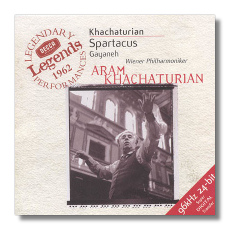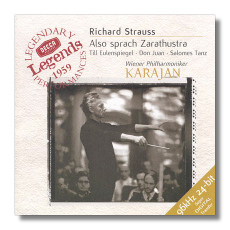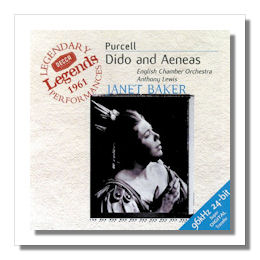
The Internet's Premier Classical Music Source
Related Links
- Latest Reviews
- More Reviews
-
By Composer
-
Collections
DVD & Blu-ray
Books
Concert Reviews
Articles/Interviews
Software
Audio
Search Amazon
Recommended Links
Site News
 CD Review
CD Review
Decca Legends

- Aram Khachaturian:
- Spartacus (excerpts)
- Gayaneh (excerpts)
- Alexander Glazunov: The Seasons
Vienna Philharmonic Orchestra/Aram Khachaturian
L'Orchestre de la Suisse Romande/Ernest Ansermet
Decca 460315-2 ADD 76:46


Richard Strauss
- Also sprach Zarathustra
- Till Eulenspiegel's lustige Streiche
- Salome: Dance of the Seven Veils
- Don Juan
Vienna Philharmonic Orchestra/Herbert von Karajan
Decca 466388-2 ADD 74:53


Henry Purcell
Dido and Aeneas
- Janet Baker (Dido)
- Patricia Clark (Belinda)
- Raimund Herincx (Aeneas)
- Monica Sinclair (Sorceress)
St. Anthony Singers
English Chamber Orchestra/Anthony Lewis
Decca 466387-2 ADD 52:45
These are three releases from the second wave of Decca's "Legends" series. This series, which debuted last year, presents classic recordings from the Decca (and allied labels) catalogue in new 96kHz, 24-bit "super digital transfers." Although some "Legends" discs will appeal to strict audiophiles, the purpose of the series is to celebrate the label's finest performers, and to put the recordings themselves into a historical perspective by including session photographs, reproductions of the original covers, and commentaries by individuals associated with the recording sessions, whenever possible.
Khachaturian and Glazunov are a strange pair, even though both were Russian and both composed effective and attractive music for the ballet. Khachaturian recorded music from Spartacus and Gayaneh several times. The 1962 recording preserved here paired him with an unparalleled orchestra and Decca's best engineering. In the booklet notes, John Culshaw recounts how unimpressively the original records sold until a decade later, when the BBC chose an excerpt from Spartacus for their television show The Onedin Line. Within weeks, Decca recouped their losses.
Khachaturian's fame doesn't rest on his podium talents. Nevertheless, he had sufficient skill to conduct disciplined and exciting recordings of his own scores. The vulgarity that other conductors afflict them with is absent here; clearly Khachaturian believed in his own music, even when others did not. The selection of numbers is standard. Khachaturian selects four numbers from Spartacus and five from Gayaneh, including the infamous "Sabre Dance," and also "Gayaneh's Adagio," which Stanley Kubrick used to good effect in 2001: A Space Odyssey. Several other recordings omit the last number, which is a shame, because it is hypnotically beautiful.
Spartacus and Gayaneh embody the ideals of Socialist realism. The Seasons, on the other hand, comes from a completely different world, one where classical (albeit decadent) beauty was enough. The music is of the highest quality. Classical radio stations such as WQXr in New York City have used its tunes as program themes – a testimony to the music's compulsive memorability. Ansermet knew his way around Russian ballet music like Julia Child knows her way around roasts; my only reservation is the fast tempo he chooses for autumn's Bacchanale. L'Orchestre de la Suisse Romande, while not the most refined of orchestras, certainly was among the most distinctive in 1966, when these recordings were made. Here again, the engineering is excellent.
By a strange coincidence, Karajan's 1959 recording of Also sprach Zarathustra also appeared in 2001: A Space Odyssey. It is difficult to overestimate the effect that this had on the music's popularity, although it wasn't necessarily Karajan's record that everyone rushed out to buy. Karajan's is one of the best, though, and his later efforts do not surpass it. Indeed, it is hard to imagine a more satisfying recording of the work than this one. From the very first notes, Karajan's heart and brains are working in concert; each one of three fanfares in "Sunrise" is more brightly colored than the one that preceded it. The splendid playing of the Viennese strings in the succeeding sections confirms that this orchestra and this work must have been made for each other. Karajan's showmanship is evident, but not at the expense of the music's philosophical content. Till Eulenspiegel is just as good – an increasingly violent explosion of hilarity and chaos, brilliantly captured by Decca's engineers the following June. The same June 1960 sessions also shed Salome's veils and Don Juan's masculine pride. Karajan's conducting is a controlled orgy of sound and sensations. The engineering can be a little overbearing, but it is atmospheric.
Janet Baker was relatively near the beginning of her professional career when she recorded Dido and Aeneas in 1961. She performed the mezzo-soprano role of the Sorceress at the Bath Festival, and was surprised when conductor Anthony Lewis asked her to take the role of Dido, which usually went to sopranos. Her dark vocal colorings contributes greatly to this recording's distinctiveness. What is surprising, though, is the insight that she gives to her portrayal of Carthage's queen, given her lack of experience in the role. This is a finished portrayal, and it continues to be one of the finest on disc. An article could be written about her singing of "When I am laid in earth" alone, and how she characterizes through phrasing, dynamics, and modulation of vocal color. The rest of the cast is variable. Clark's Belinda is good, Herincx's Aeneas is blustery (what does Dido see in him?), and Sinclair's Sorceress is a bawdy grotesque. The St. Anthony Singers are a lusty crew.
This recording does not have the benefit of recent Purcell scholarship. It also predates the original instruments and performance practice movement by more than a decade. In this sense, Lewis's performance is a little old fashioned, but not unpleasantly so. His touch is light, and the same could be said of Thurston Dart's continuo playing. Hearing this Dido is like wearing a comfortable sweatshirt that you've owned since college.
Copyright © 2000, Raymond Tuttle


















